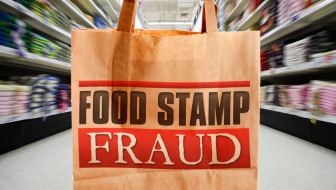BIRMINGHAM – A Bessemer grocery store owner pleaded guilty today in federal court to defrauding the food stamp program of more than $5 million, structuring cash transactions and laundering money to hide the illegal profit, and evading federal income taxes, announced U.S. Attorney Joyce White Vance, IRS Criminal Investigation Special Agent in Charge Veronica Hyman-Pillot and U.S. Department of Agriculture Office of Inspector General, Investigations, Special Agent in Charge Karen Citizen-Wilcox.
HASAN F. AHMED, 50, owner and operator of Associated Discount Foods on Ninth Street South in Bessemer, pleaded guilty before U.S. District Judge R. David Proctor to one count each of food stamp fraud, tax evasion and structuring currency transactions and four counts of money laundering. As part of his plea, Ahmed agreed to forfeit $5.2 million to the government as proceeds of his illegal activity, including his interest in $375,027 which the government already has seized from the grocery store and four bank accounts. Ahmed’s sentencing date has not been set.
“The SNAP program provides assistance for those who need help to feed themselves or their families. It is not an open pocketbook for criminals to abuse in order to selfishly enrich themselves,” Vance said. “This was not a victimless crime. Instead of fulfilling his obligations, Mr. Ahmed used his position to defraud $5 million from a taxpayer-funded program.”
“Hasan Ahmed made an illegal profit by taking advantage of a benefit program,” Hyman-Pillot said. “His actions were a direct misuse of tax dollars. IRS Criminal Investigation and our law enforcement partners will work aggressively to uncover similar schemes and return the illicit proceeds back to the United States Government.”
“Ahmed’s plea should serve as a warning to all stores that participate in the Supplemental Nutrition Assistance Program as vendors that fraud and trafficking of EBT benefits, which is purchasing those benefits for cash, will be vigorously investigated and prosecuted by the USDA-Office of Inspector General, the U.S. Attorney’s Office, and all of its federal, state and local partners that have a stake in ensuring that fraud is eliminated from taxpayer-funded programs,” Citizen-Wilcox said.
Associated Discount Foods is a mid-sized neighborhood grocery store that was authorized by the USDA to accept SNAP food stamp benefits.
From January 2007 through December 2010, the store’s average monthly SNAP redemptions were $4,196, increasing to $17,457 in January 2011, according to Ahmed’s plea agreement with the government. By April 2011, the store’s monthly SNAP redemptions surpassed the average monthly redemptions of five other medium-sized grocery stores within a 14-mile area, according to the plea agreement.
“Based on ADF’s total SNAP redemptions and comparison analysis, the defendant acquired an estimated $5,243,866.49 in SNAP benefits from July 2011 through June 2014 in a way that was contrary to law,” the plea agreement states. Ahmed’s redemptions rose dramatically because he illegally swapped food stamps for cash, at less than the stamps’ face value, and allowed customers to purchase ineligible items with food stamp benefits at inflated rates, according to the document.
Ahmed evaded taxes on the illegal income when he filed a federal income tax return for the 2013 tax year claiming total income of $24,728 when his actual income was $210,927, according to his plea.
Ahmed’s plea agreement outlines his money laundering and illegal currency structuring as follows:
Ahmed controlled a BB&T checking account opened in the name of a relative, identified in court documents as R.N. Between June 2013 and June 2014, in four separate transactions, he deposited $58,100 in proceeds of his food stamp fraud into R.N.’s account. Ahmed moved money into R.N.’s account from his grocery store’s business accounts, where SNAP benefits were electronically deposited, to conceal or disguise that the money was the product of his food stamp fraud.
Ahmed illegally structured financial transactions in an Associated Discount Foods business account at BB&T, making two withdrawals of $10,000 and 36 withdrawals ranging from $9,200 to $9,900, for a total of $362,900, between January and May of 2013. After a bank teller informed Ahmed that transactions over $10,000 had to be reported, he made no further currency transactions over that amount.
Financial institutions are required by law to report currency transactions above $10,000 to the U.S. Department of Treasury. “The defendant engaged in these transactions to evade the reporting requirement” on the 38 withdrawals, according to Ahmed’s guilty plea.
The maximum penalty for both food stamp fraud and tax evasion is five years in prison and a $250,000 fine. The maximum penalty for money laundering is 20 years in prison and a $500,000 fine or twice the value of the property involved in the transaction, whichever is greater. The maximum penalty for currency structuring is 10 years in prison and a $500,000 fine.
IRS-CI and USDA-OIG investigated the case, which Assistant U.S. Attorneys Erica Williamson Barnes and Daniel Fortune are prosecuting.


























